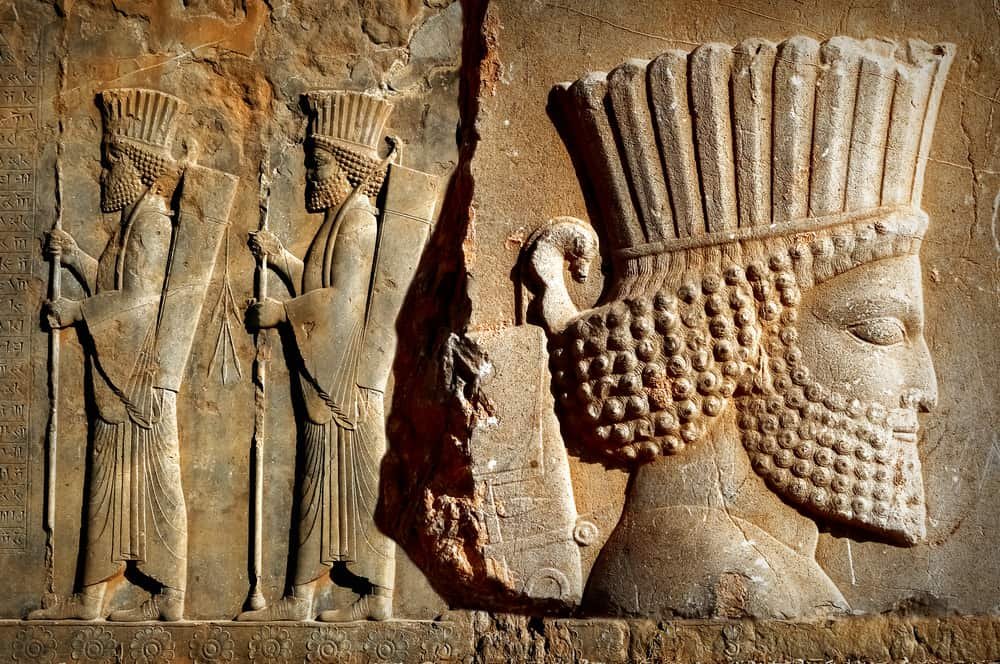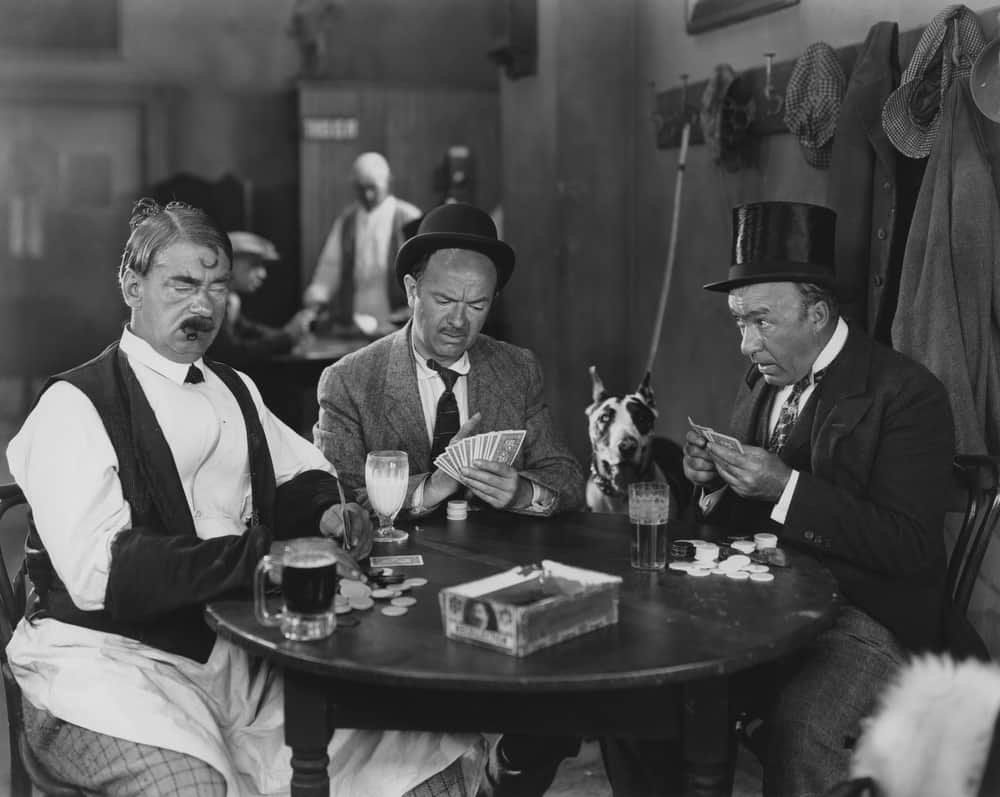Last Updated on January 7, 2024 by Gamesver Team and JC Franco

If you are a true poker fanatic, you would know where it comes from, right? Wrong! Poker’s origin is actually quite hard to trace, so you would be forgiven for not knowing.
When people start to talk about the earliest traces of poker, it can get a little confusing. Some people trace the actual gameplay; others trace the money – before you know it, your mind is boggling. So, where does it really come from? I am happy to speculate and of course, share what I know.
The history of poker is hard to determine. There are claims that it is based on the Persian game “As-Nas” (16th c.). This seems like the most likely origin based on the actual gameplay; however, some historians disagree. Others claim that poker originates from the French game “Poque” (15th c.).
The fact that the origin of poker cannot be precisely determined just goes to show how games can transform and change over time. I have done a lot of reading on the subject and feel that it really is up to the individual to decide which version/story is more likely in their shared opinion.
Below I take a look at both games – As-Nas and Poque – so that you can decide for yourself. If you want to have more to go on, simply read on to find out more.
Content
ToggleWhat is As-Nas, and How is it Similar to Poker?
Before you can rule out the theory of poker originating from As-Nas, you need to understand the Persian game a little better. I certainly noticed the similarities in the 2 games and feel it is plausible that poker is based on the same gameplay – you might have a different opinion. You might immediately notice the similarities. So, what is As-Nas?

As-Nas was a game that was played with 20 cards. There were 5 ranks in the deck which
- Dancer – called “the couli”
- Soldier – called “serbaz”
- Queen – called “bibi”
- King – called “shah”
- Ace – called “as”
As you probably already know, the earliest version of poker was also played with just a 20 card deck. In the mid-1800s, players started playing poker with a 52 card deck.
To play As-Nas, each player was given 5 cards, which depleted the entire deck. The main objective of the game was to decide if you should bet or bluff. Betting was common, but there were no draws and no remaining cards for dealing. If a player said “not seeing, I have seen”, it meant that he was straddling and was about to bet without even taking a glimpse at his hand.
What is Poque, and How is it Similar to Poker?
Now that you know how similar As-Nas is to poker, you might want to compare the gameplay to Poque too, so you can decide which game you feel is more similar. I personally find the game of Poque to be quite complex in comparison, and I do not really know if I buy that it is the original game. Some believe that Poque became “Poker” because of the English trying to pronounce the word incorrectly.
What is Poque? Poque is a French bluffing and betting game. The earliest mention of Poque is in the 1400s, and it is said to have been the forerunner to poker, which only really developed in the United States in the 19th Century.

The game is typically played with 3 to 6 players. If 3 or 4 players play Poque, then the 32-card French playing card deck is typically used. In the case of 5 or 6 players, the 52-card deck is used. A Poque board is used for the game, which has 9 pools. 8 stakes are placed onto the board, leaving the last pool for “Poque” clear. This is only used in the last round. The pools on the board are:
- Ace
- King
- Queen
- Jack
- Ten
- Mariage
- Sequence
- Poque
The game of Poque is dealt and played in a clockwise direction. Once the cards are dealt out, and players are ready to begin, each player antes a chip into each pool, excluding the Poque pool. Players can then look at their cards, and the dealer turns the top card over to determine the trump suit.
Players then collect the value of their cards from the relevant pool. Once all pools have been collected, new stakes are placed and then a vying round proceeds. It is this round that is very similar to poker as we know it. The person who has a set of cards and wants to wager places his stakes in the middle of the board, and then it is open to other players to decide if they think they can beat it or not. Players can also pass and drop out, similar to the better round of poker.
The winner of this round then starts the play for the final round by playing the card of his choice. Players with the next highest card place their card on top of his card, and this continues until there are no cards left.
As you can tell, Poque can get quite complicated. The gameplay and rules also change from one area to the next. What I have mentioned above is just a basic guideline of what to expect in a game. Can you see the similarities between Poque and Poker? Claims of it being the origins have merit, but does it sound like it really is the origins of poker? The jury is out on this one.
The History of Poker in the United States
We have ascertained that we do not quite know for sure where poker originates from. The history of the exact origins can be murky at best. Perhaps it is better to analyze poker’s history in the United States. The history of poker in the US is not entirely clear, as the first creation of poker is based on a game (which game? We don’t know!). Still, it is easier to pinpoint where and when poker, as we know it today, emerged.
Mississippi River

Poker, as it is known in the United States, was developed in the 1700s and 1800s, when riverboat gambling on the Mississippi River became the ‘in’ thing. The gameplay and culture of poker were birthed right there, in those gambling boats.
During this time, it was evident that a form of As-Nas was being played in the many riverboats and gambling houses that flanked the river. The game was played with 20 cards and in most instances, with no draws and with the best hand wins claimed after rounds of placing bets and raising stakes. Does this sound familiar to you? It did to me!
Over the years, the 20-card deck was changed to a 52-card deck and poker as we know it now was invented. Stud poker, which is a style of poker that many people still play today, was the very first type of poker played in those riverboats and gambling houses.
In the 1700s, the poker game was more about strategy and fun than what it has become about today. In the 1800s, it morphed into something that was more about money. Some historians like to call this the “poker culture” that was emerging. Poker culture is still thriving today – people love to play for money. It was during this time that gambling houses started offering the opportunity to win cash by showing off your poker skills.
How Poker Spread Throughout the US
You might wonder how this poker culture spread from the Mississippi to the rest of the country. How did it spread so far and wide? That one is a fairly simple one to answer because it’s logical.
Most of the people in the area were actually gold prospectors at the time. They would spend some time at the riverboats and casinos, but they were also traveling in search of gold, which meant that they didn’t stay in one place for very long. As they traveled and visited saloons along the way, they took knowledge of the game with them, and so the game of poker became more widespread.

That pretty much covers the game of poker and how it made its way to us. Wondering about online poker? Well, that only made its first appearance in 1998. It was first listed by a site called Planet Poker. Of course, as the internet grew and flourished, this first-time producer of online poker fell by the wayside. If you visit their website today, you will notice that you cannot actually gamble on it at all.
In closing
Many people simply are not satisfied that there are not more details, names, and dates assigned to the history of poker. Unfortunately, the way the game was invented makes it difficult to assign any real origin and background. However, now, you know the basics. And if you already consider yourself a poker fanatic – these basics should be enough.
This article was co-authored by our team of in-house and freelance writers, and reviewed by our editors, who enjoy sharing their knowledge about their favorite games with others!
-
Gamesver Team
-
Gamesver Team
-
Gamesver Team
-
Gamesver Team
-
Gamesver Team
-
Gamesver Team
-
Gamesver Team
-
Gamesver Team
-
Gamesver Team
-
Gamesver Team
-
Gamesver Team
-
Gamesver Team
-
Gamesver Team
-
Gamesver Team
-
Gamesver Team
-
Gamesver Team
-
Gamesver Team
-
Gamesver Team
-
Gamesver Team
-
Gamesver Team
-
Gamesver Team
-
Gamesver Team
-
Gamesver Team
-
Gamesver Team
-
Gamesver Team
-
Gamesver Team
-
Gamesver Team
-
Gamesver Team
-
Gamesver Team
-
Gamesver Team
-
Gamesver Team
-
Gamesver Team
-
Gamesver Team
-
Gamesver Team
-
Gamesver Team
-
Gamesver Team
-
Gamesver Team
-
Gamesver Team
-
Gamesver Team
-
Gamesver Team
-
Gamesver Team
-
Gamesver Team
-
Gamesver Team
-
Gamesver Team
-
Gamesver Team
-
Gamesver Team
-
Gamesver Team
-
Gamesver Team
-
Gamesver Team
-
Gamesver Team
-
Gamesver Team
-
Gamesver Team
-
Gamesver Team
-
Gamesver Team
-
Gamesver Team
-
Gamesver Team
-
Gamesver Team
-
Gamesver Team
-
Gamesver Team
JC Franco
JC Franco serves as a New York-based editor for Gamesver. His interest for board games centers around chess, a pursuit he began in elementary school at the age of 9. Holding a Bachelor’s degree in Business from Mercyhurst University, JC brings a blend of business acumen and creative insight to his role. Beyond his editorial endeavors, he is a certified USPTA professional, imparting his knowledge in tennis to enthusiasts across the New York City Metropolitan area.

